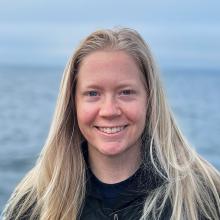
Stef Mellon
Tell us about your work/research. What kinds of things do you do?
As a scientific data specialist, I work as part of a team of 12 people that monitor all of the ocean data that is archived and made publicly available through Ocean Networks Canada's data portal. I monitor instruments that measure ocean properties such as temperature, salinity, density, oxygen concentration, and chlorophyll. I'm also involved in a project, called Community Fishers, in which ONC helps communities conduct their own coastal environmental monitoring programs. We train community members to operate oceanographic equipment and conduct regular sampling, and then we provide data storage and quality control. My day-to-day is usually fast-paced and involves daily checks of all the sites I monitor, reporting issues, and spending lots of time problem-solving. I've recently been working with a group that is trying to come up with innovative solutions to prevent biofouling on our cabled instruments. Biofouling is essentially unwanted sea-life growth that can clog sensors and reduce the quality of ONC's data. It's one of the common issues I catch during my daily checks, and is the cause of many of the instrument swaps we will be doing on this OET expedition!
What sparked your initial interest in your career?
I've always been interested in the natural world and knew I wanted to go into the environmental sciences. It wasn't until I moved from Ontario to Halifax for the university that I found my love for the ocean! At Dalhousie, I learned about how under-studied the ocean is, yet how important it is for understanding large-scale processes, like global climate change, and smaller-scale issues, like the health of communities that depend on the ocean as a primary food source. I wanted to go into a career where I could have a positive impact.
Who influenced you or encouraged you the most?
I had a really great supervisor in graduate school who encouraged me to follow my scientific curiosities and keep a positive outlook. He helped coordinate some pretty neat opportunities within the paleoceaongraphy field that helped kickstart my career. Some highlights were: a three week expedition in the Labrador Sea, a one month field school in Urbino, Italy, and an eight week expedition collecting sediment cores from the Emperor Seamount Chain.
What element of your work/study do you find the most fascinating?
I love that in my job I have eyes on what’s happening in the ocean in real-time. It’s cool to think that I am one of the first people to know when interesting changes are happening off the West Coast of Canada, such as upwelling or mixing events. I am currently keeping my eyes peeled for the first signs of the forecasted El Nino.
How did you get involved with the Ocean Exploration Trust?
Ocean Networks Canada has been working with OET for our offshore infrastructure maintenance expeditions for many years now. My job role usually requires that I sit behind a computer screen, but I love spending time in the field and experiencing the physical operations side of the instruments I monitor. I expressed to my managers that if an opportunity arises, I would be quite keen on joining an expedition. The timing worked out that my jack-of-all-trades skill set was needed at-sea!
What other jobs led you to your current career?
When I was at Dalhousie University, I had the opportunity to try out some cool jobs through the science co-op program. I spent a semester working with meteorologists at the Atlantic Storm Prediction Centre doing air quality forecast verification; I traveled to northern Germany as a research assistant on a microfossil paleoceanography project; and I spent a summer in a biogeochemistry lab with a professor who I ended up choosing to do my Masters with. I've also spent many summers working as a camp counselor and outdoor canoe trip leader.
What are your degrees and certifications?
Combined Honours BSc in Ocean Science and Environmental Science- Dalhousie University 2015
Masters of Science in Oceanography -- Dalhousie University 2018
What are your hobbies?
I love kiteboarding, rock climbing, and pretty much anything that will get me outside in the evenings and on weekends. I also really love relaxing with a good non-fiction book.
What advice would you give someone who wants to have a career like yours?
If you are interested in the ocean sciences, there are quite a few paths you can take: physics, chemistry, geology, biology, engineering and more! Follow whichever path interests you most and keep up your math and programming skills! They can be tedious to learn, but end up being so useful down the line and when you are looking for jobs.
Expeditions
Stef participated in the following Ocean Exploration Trust expeditions:
